Why do Africans have dislikes against Europe and Asia - but not Russia and China?
Among supporters of Russian invasion of Ukraine since February 2022, one of the most surprising supporters of Russia, to be frank, are the Africans. Though most supports are founded entirely in West, East and South, rather than in North Africa, but this is a huge disparity considering that North Africa only contributed over 15% of the population of the continent.
This shocking high amount of pro-Russian sympathy toward Africa is not entirely unfounded, and so is the pro-Chinese sentiment among Africans. Yet a major distinction is that, African love for Russia and China do not necessary mean they will see them parts of Europe and Asia. In the mind of Africans, mostly the less educated Sub-Saharan ones, Russia and China are like in a different planet than the remaining countries, even if this is compared to Latin America.
What has fuelled Africans to become indulged in their own hypocrisies about Russia and China have to be understood from the past of the Africans.
From colonial background...
Africa lies very close to Europe, just separated by the Gibraltar and Mediterranean Sea. And yet until 19th century, Europe only did business with North Africa, which is also the richest and most developed region in Africa. North Africa is already different by its own - it has distinct histories, ancient ties with Europe and West Asia/Middle East. This part was already under the Ottoman control when the Europeans began to smell the decline of Turkish power.
France spearheaded by its conquest of Algeria in 1830 and later on, the rest of Europe scrambled to annex more and more parts of Africa. By the end of 19th century, only Liberia and Ethiopia maintained nominal independence.
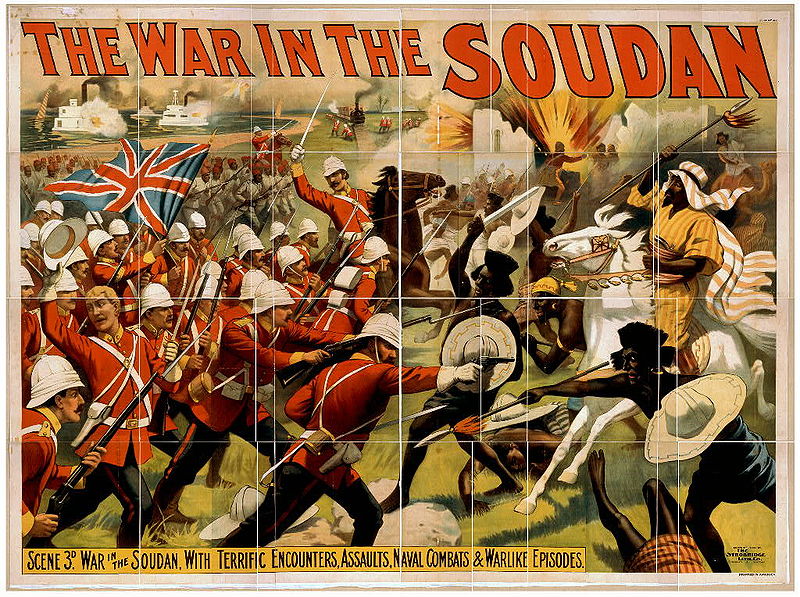 |
| British conquest in Sudan during the Mahdi War. |
The Europeans made Africa a property and plundered resources for their own. Different colonial empires but shared one common treatment, the Africans became increasingly resentful of European presence. North Africans led the massive resistance, foremost, while the rest of Africa was still struggling to come on term with the Europeans but lacked a common front like that of the North.
During the 1950s, shortly after France was dealt a blow in Vietnam, anti-colonialism emerged rapidly in Africa. Almost every empire here realised that they were no longer welcomed, so they decided to withdraw. Some desperate empires like Portugal and Spain tried to hold on its colonial possessions would not see it last forever. By 1975, the last European troops evacuated, leaving the Apartheid regime in South Africa the last bastion of European influence, before Nelson Mandela helped to put an end of this racist regime in 1990s.
But the physical scar is too deep.
 |
| Congolese slaves and its Belgian owners in early 1900s. |
Colonial control by the Europeans was not just looting only. It also indiscriminately killed civilians, exposed racism, forced labour and other forms of brutality. The Africans have always recalled the barbarity of the European empires. And even when these nations mostly won independence, Africans still feel that their countries being controlled by the European powers, most notably France, which prevented them from fully embracing their own development. The memory of the assassination of Patrice Lumumba, a DR Congolese independence activist, to the hand of Belgium and the United States, is an example as well. Hence, instead of dissipating the sentiment, anti-European/Western fervour persisted for generations.
...to the feeling of inferiority
Yet, Africa is not the only one to feel the pain of European and Western imperialism. Its once inspiration, Asia, had also been under European jokes in the same time of the scramble to Africa. The Asians actually have a lot to dislike from European colonial control as well.
For instance, during the United States' invasion of the Philippines in 1899, the Americans engineered a holocaust-like policy of scorched earth and brutal mutilation of civilians in order to conquer its newfound colony that Spain ceded. The policy was horrific by the high amount of casualties, up from 200,000 to one million killed. Then, France imposed a bloody rule over Vietnam, killing all forms of resistance to build a French colony. The World War II saw India suffered a bloody famine by the British conquerors, while at the same time in West Asia, Britain instigated racial riots between Arabs and Jews to enhance domination in its Palestine colony.
 |
| Skeletal remains of Filipinos killed during the American conquest. |
In fact, Africans found inspiration for independence from none other but in Asia. India's non-violence movement had inspired many oppressed people about fighting for their rights, and this movement was instrumental in ending the British rule, though it was followed by a bloody partition in 1947. In 1954, a shock new erupted across the world when the French military was defeated by the Vietnamese, emboldened the confident of toppling the European powers among Africans. Indeed, Vietnam gave the biggest and most important element in removing Western empires out of Africa.
But as the time progressed, Africans, from admiring Asian resistance, turned into a frequent feeling of fear and resentment. This comes with a reason: Asians are not interested in helping Africans to elevate at all. Asian nations have mostly risen from the ashes of war and destruction it suffered, therefore it had no interest in delivering supports for Africa. Moreover, as Asian nations began to embrace more and more economic and social reforms by 1990s, these nations have succeeded in gaining back respect and reputation, with some nations actually developed an economy that rivalled to the West, some are even better, such as South Korea, Taiwan, Japan, Singapore, Turkey, Malaysia, Thailand, the UAE and Israel. Today, China, Japan, South Korea and India form the bulk of one of the world's growing economic hotspot.
This disparity can be traced much to history, with Africa only has three major civilisations to speak for (Egypt, Carthage-Tunisia and Abyssinia-Ethiopia). Egypt and Tunisia later provided a guideline for the fellow North African nations like Morocco, Algeria and Libya, the former would go on to build its history for a thousand years as an independent Arab-Amazigh state. But with only Egypt really came to the point of being a great civilisation from Africa, Egypt was dwarfed by Asia's ancient contribution - Asia is home of three biggest civilisations (China, India and Persia-Iran) of more than 5,000 years old. Even some of the smaller civilisations also had such ancient glories, like Mesopotamia Iraq also of 5,000 years, to Syria, Phoenicia Lebanon, Anatolia, Xiongnu of Central Asia and Mongolia, Nepal, Tibet, Israel, Ceylon, Korea, Japan, Vietic state in modern north Vietnam and Funan in modern Cambodia, which spanned between 4,000 to 2,000 years old BC. As such, the Asians developed their sense of nationhood and aspiration very early, hence becoming stronger has always been their main goals - unlike most of Africa, hence the economic understanding among Asians are stronger than Africans.
Asia's rise has also carried another toxic influence: disrespect of old comrades. Africans, mostly beyond Saharan Desert, have been run by a series of corrupt governments and the economies have failed to meet up expectation. This led Africans to move to many countries, some to Asia - but racial problems started to emerge. People from West to East Asia have poor perception of Africans and some equalled them as drug lords and criminals. Nigerians have long been linked as drug dealers across Asia since late 2000s, which culminated into arrests in Southeast Asia and India. Hong Kong since 2020s witnessed a growing surge of African criminal organisations. Likewise, criminal gangs in Africa are thought to have allied with Hezbollah to export cocaine to the Middle East and Europe.
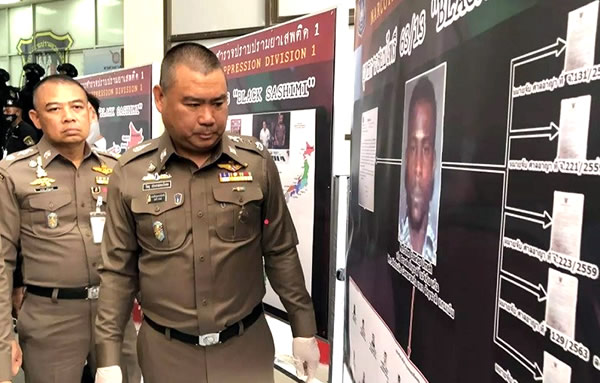 |
| Thai police inspected a list of Nigerian drug dealer networks. Nigerian drug lords have played a role in rising negative stereotypes against Africans in Thailand and Asia. |
Considering Asians tend to behave aggressively when their nations are insulted, Asian racism against Africans have risen due to Africans' criminal activities. Depiction of Africans are frequently negative and horrific enough to make Africa a scapegoat, a burden to Asian society. No society has this issue greater than South Korea, a fairly developed country, where Africans face enormous difficulties which was reported by Foreign Policy in 2020. In Thailand, there has been controversies about the whiteness vs blackness, and Thai advertisements usually echo the stereotype of being black in a negative style, as occurred back 2016 when a Thai advertisement was forced to apologise for the depiction. India is also renowned for being extraordinarily racist against Africans, a poor reputation for the most populous democracy. In Japan, it is not easy to accept Africans either, the society is very homogenous in general and has struggled to come on term with the problem. Far to West Asia, Lebanon, going even further, has long treated Africans as sub-standard people. Of course, cases of Thailand, Lebanon, India, Japan and South Korea are not rare - it is a norm across Asia, meaning that you can also find the same thing in Bangladesh, Israel, Vietnam, Saudi Arabia, Cambodia, Pakistan, Indonesia, Qatar, Iran, Kazakhstan, Malaysia, the UAE and Turkey. Already the kafala system in West Asia has been widely criticised as a slavery system, but little has improved.
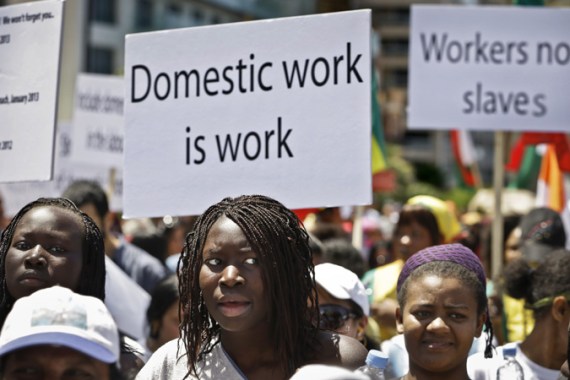 |
| Africans have long been maltreated by West Asian owners. Photo about protest against maltreatments of Africans in Lebanon by Ethiopians. |
Due to these poor perception against Africans by modern Asians, the Africans have intensified their growing hatred, with now both Europe and Asia being made scapegoats and blamed for Africa's failures. This comes combined by: painful colonisation left behind by the European powers, initial respect turned to suspicion of Asians due to economic disparity, criminal networks operated by Africans in Asia and African history of migration due to internal crises to both Europe and Asia. Whatever the matter is, Africans have found someone to deflect their own failures.
Yet, China and Russia are different?
Africans have a strange taste in geography. China and Russia, therefore, benefited from manipulating the Africans. In some aspects, Russia and China have an advantage and they utilised these things well.
For Russia, the country has never taken part in the colonisation of Africa, even during the Tsarist era as Russia was only interested in inland expansion. Its Soviet successors guaranteed by supporting African independence movements from Western European powers. It's not a surprise why so many Africans hold Russia with immense respect and the collapse of the Soviet Union was poorly welcomed by the Africans in majority. Russia today remains a patron among Africans and millions of Africans seek scholarship in Russia.
Not surprising, the Russian flag has been waved in Ethiopia's independence day back in 2021 whereas Russia was also welcomed by millions of Malians during the coup d'état launched by Assimi Goita, as the Malian junta affirmed its willingness to cooperate with Russia and expelled Western military personnel, mostly French ones but also Danish, German, Italian, Dutch and Spanish soldiers here. Russia-backed mercenaries also operated in Libya and Central African Republic, helping different factions at war and installing pro-Russian regimes there.
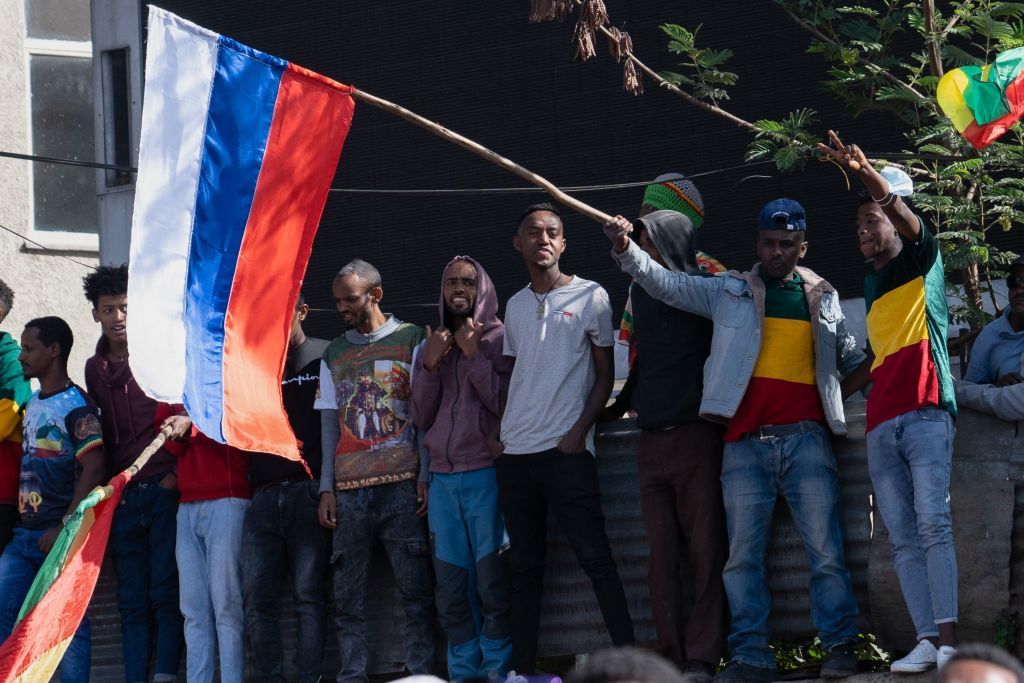 |
| Ethiopians waging Russian flag in Ethiopia's independence day on May 5, 2021. |
China is different a bit. Unlike Russia, China is far richer economically, militarily and politically. Because China possesses a gigantic economy, Chinese investors have also become more and more relevant in Africa. Chinese investors are also well-received due to large-scale investments and for the fact that it does not give a damn about financial requirement, something other investors would do. Indeed, China offers cheap but high price loans for African nations to invest and develop. With the exception of rich North African nations like Egypt, Morocco and Tunisia (that are mostly cautious), the rest has backed China's plans, explained by the majority of African nations endorsed the Belt and Road Initiative.
 |
| China has a strong economic presence in Africa. |
China also has a similar advantage like Russia that it has never involved in Africa unlike its European enemies, but so are the rest of Asia, with only Turkey and the Arabs to have colonised Africa. Knowing this, China has made up relations with Africa by using its economic muscle. Therefore, unlike Russia, China can claim more credibility in helping Africa economically rather than Russia's unstable projects that depend on military might and nostalgia.
Still, what allowed Russia and China to maintain its domination in Africa is because neither Russia and China saw themselves parts of European or Asian civilisations. Russia and China represented to Africa as two totally different but aligned world, and that these nations have nothing to do with their birth continents. To demonstrate is very simple: they provided the loudest voices embracing African struggle for their freedom from the European colonists - while at the same time tried to conquer neighbouring European and Asian nations. Russia and China represent a typical sense, as written by Euromaidan Press' Orysia Hrudka as,
"What the land-empires did was not a racial division of labor nor merciless exploitation of territories – proper to European overseas empires – but the imposition of their cultural and political models…"
Since most Africans are not taught about the differences between overseas empires and land empires (Africa is colonised by overseas powers), Africans have allowed Beijing and Moscow to use them as a bargaining chip. Russia and China, in particular, misled Africans through distortion to distortion. This is also manifested in the crusade of Chinese and Russian state media, in particular throughout two propaganda machines: Russia Today (RT) and CGTN. To make it even more concerning, there have been attempts to reinstate RT in South African TV channels (South Africa is a major telecommunication power in Africa) and many Africans also echoed Chinese disinformation about the war in Ukraine, usually on Moscow's side.
| The African logo of China's state propaganda CGTN, the international subsidy of CCTV. |
This also comes with extensive denial of maltreatments of Africa in both Russia and China, and this has, sadly, succeeded in many way of indoctrinating lies on the brain of African nationals. Reports about Africans frequently suffered racist attacks and discrimination by Russians has been running riots in recent years, or China's poor treatment of Africans that goes back for decades, appear not deterring Africans from watching the Russian and Chinese disinformation campaign. Therefore, their outrage tend to be short-lived thanked to effective denial campaigns Moscow and Beijing have prepared, and also due to low education.
To be or not to be?
This has a profound impact in how Africans view the current Russian invasion of Ukraine. Instead of watching honest news, Russian and Chinese propaganda now run riots in Africa and most Africans have celebrated the Russian invasion without speaking (of course this came from news that Africans have been discriminated in Ukraine while trying to flee war). A large chunk of African mercenaries are being sent by Putin to kill Ukrainians.
Chinese regime, likewise, also sees African supports as the mean to strengthen its grip in Africa, as dictators and somewhat anti-Western democratic leaders of Africa frequently echo Russian narratives. Russia and China have together acted in lobbying and evoked the past of these African nations while manipulating history of modern Africa for their shared goals. African resources have been mercilessly stolen and taken away from Africa by Chinese and Russian investors with Africans know nothing from it.
Ironically, the trend of denial also goes as far as rejecting the fact that Russia and China have, so far, no African-descended officials in their governments while Africans are becoming more and more an important pillar in many societies that they used to loathe over as they become more aware of their rights, something Russia and China won't give permissions. United States' current Secretary of Defence, Lloyd Austin, is of African descent, making him the first African to occupy this post. Likewise, Barack Obama, the 44th President of the United States, is the first Kenyan to become President.
 |
| Then U.S. President Barack Obama and General Lloyd Austin in Tampa, Florida, 17 September 2014. |
Likewise, a growing number of Africans have become MPs in France, the United Kingdom, Germany, and other European nations, though the number remains small in general. Japan, India and South Korea are making efforts to combat racism against Africans, though in a slow process and would take generations to achieve. Russia and China's state censorship made it difficult for Africans to have their voices heard as Moscow and Beijing will suppress any reports about state or popular racism committed by Russian and Chinese nationals to represent the "fresh images" of Russian and Chinese tolerance. As Chinese activist Zheng Churan addressed as far as in 2018, shortly after outrage about depiction of "black faces" in China's Lunar New Year Gala right on her article, "China has no problem with racism, and that’s a problem". This is also applied to Putin's Russia.
What made it so difficult to combat racism in China and Russia is not entirely state's faults. While Moscow and Beijing have been doing censorship for years, it also lies within the societies of both authoritarian states. Russians and Chinese wholeheartedly follow their governments and will defend them when they commit any wrongdoings. This is not a recent-based action, it is rather coming from a prolonged process of their imperial histories of thousands years. As such, the depiction of Africans goes that way - like useful idiots who will not question whataboutism of Moscow and Beijing. Not far away, China's movie blockbuster Wolf Warrior 2 (in which the Chinese policy Wolf Warrior comes from) has depicted Africans as savages, war criminals and poorly educated, being defeated by a former People's Liberation Army personnel and then celebrated his coming, and they are just one of them - still become a hit in some African nations.
In the end, we go with "to be or not to be" as a perfect illustration. Africans are either in denial, or, quietly ignoring their own positions for personal grievances. In this aspect, Africans are actively helping Russia and China continuing their denialism despite seeing these hypocrisies first hand, while Russians and Chinese, from bottom to top, also campaign to falsify the narratives with tacit African approval.
Can this change?
Yes, but not easy. In fact, like how American, European and Asian countries have just begun to learn the unfortunate effects of racism and their own hypocrisies, as indicated by a massive series of education reforms since mid-20th century (and still ongoing), Africans will have a hard time to overcome the effects of Chinese and Russian disinformation and to revalue their true African sense. It's not easy because for over 60 years, Africans remain nostalgic and sympathetic to China and Russia, while at the same time Beijing and Moscow do nothing to deal with the racist problem.
For America and Europe, the most important issue when dealing with Africa is their acknowledgement of the past, including unnecessary regime changes. For Asia, they must differ between African criminal networks and normal Africans while reminding that Africans owed independence not by China, but by the heroic stances of Indians, Israelis, Koreans, Indonesians, Filipinos or Vietnamese, depending on circumstances. It must be underlined that, China and Russia played no role and only abused the history of Africa to jump into the continent and pretend as saviours.
Re-educating the past to avoid a similar tragedy in the future will be the key because, as Putin's brutal invasion of Ukraine has largely stalled, Russia and its ally China will be likely ramping up their disinformation tactics to Africans and to further win the hearts of divided Africans - and these attempts have achieved some successes, allowing both Moscow and Beijing to intensify imperialist ambitions.
Meanwhile, Africans need to be opened to the truth and to understand that Russia and China can't be reliable in long term. Africans must also be taught that, only themselves hold the future of Africa, not the dictators of Beijing and Moscow. Africans need to be encouraged to become more industrial, more active in economic integration. Massive domestic education reforms and economic investments must be taken seriously.
Right now, we have promising signs that some African statemen have realised that Russia and China are dangerous for Africa. Kenyan Ambassador to the United Nations, Martin Kimani, has made a powerful speech reminding that Russia is behaving like how European empires divided Africa in the past, or DR Congo government questioning the honesty of Chinese investments. But more needs to be taken, including realistic assessments, understanding of the past, misgivings, social investments... all are necessary to fight against growing revanchist, revisionist natures of Putin and Xi Jinping. And this is a must to decrease mutual hostilities between Europeans/Asians and Africans.
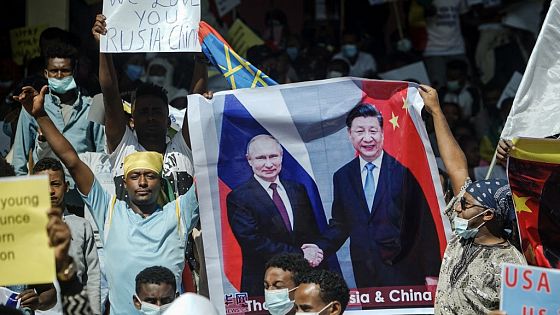


Comments
Post a Comment